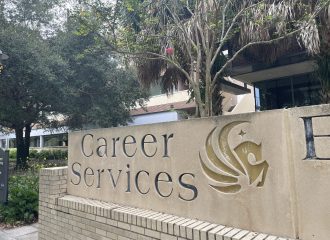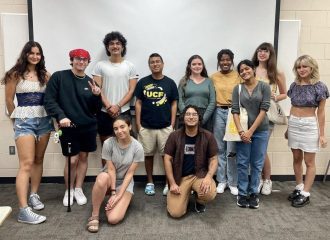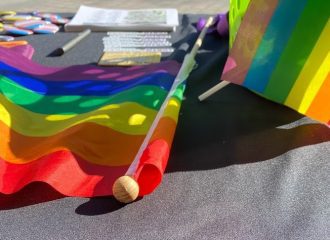by Francisco Acevedo
If you are a veteran like me, then you can probably identify with words like honor, courage, and commitment. You might also be one of thousands of other veterans registered for classes here at the University of Central Florida. Many veterans attending college these days are faced with a variety of challenges. The transition from military to civilian life can be very stressful and confusing. College life is enough of a challenge without having to deal with things like combat stress, depression and an overall feeling of exclusion. We keep to ourselves; many of us already in our late twenties struggle to find common ground with people roughly 10 years younger. In the military there was structure, we were told what was right and wrong, where to be and when to be there. For many of us, we trained and fought next to people for years, creating bonds that will last a lifetime. We were important to the mission and to our comrades
Today, small fish in a big pond, veterans struggle to fit in and adapt to college life. This guide can help veterans get the most out of their college experience. With some helpful resources and valuable information, any veteran can have a fun social life, get involved with the academic community and manage their GPA.
Helpful Tips for Veterans Wanting to Find a Place in the College World:
Combat loneliness: The National Education Association’s Alison Nighthall wrote, “The loss of friendships, purpose, identity, structure, and income is enough to push most people to their limits. Throw in an unfamiliar social system that bears no resemblance to the military, has no clear chain of command, and is filled with many students and faculty who can’t even imagine the student veterans’ experiences, and you have a deeply alienating environment for many of them.” Most of us know these feeling of loneliness and alienation all too well, but you are not alone. More and more service members are separating from active duty and going to college. According to Completing The Mission: A Pilot Study of Veteran Student Progress Toward Degree Attainment in the Post 9/11 Era, by 2011, over 900,000 veterans had used the benefits offered through the Post-9/11 G.I. Bill. Here are some ways vets can socialize and help to “bridge the gap”.
The VARC: The Veterans Academic Resource Center is the one place on campus we can call our own. Use it! The center is a fairly new resource developed by the university to aid veterans during their time at UCF. The facilities are available to student veterans for web access, office space, lounging, and general help for many of your academic and personal needs. They also offer intramural sports teams, where you can join other veterans to compete in your favorite sports while making the best out of your teamwork and athletic abilities.
Time for New Friends: We are largely outnumbered on campus by the civilian population, and you know what they say,“If you can’t beat them, join them.” Some of us only participate in class when discussing military topics, and many times once classmates find out you were in combat, it usually leads to questions or comments that although seem innocent to most, can cause us to relive some traumatizing experiences. Try not to take other’s ignorance of your experiences personally. If you don’t feel comfortable talking about certain things to others, don’t be afraid to let them know what subjects are sensitive ones. Also keep an open mind. I know it’s hard to relate to many of your peers, but take some time to get to know them, you might find that you have a lot more in common than you think.
Academic Success: Many veterans were high achievers in the military. Many of us bear medals for heroism, hard work, and good character. Anyone who has served knows we are not strangers to examination. Physical fitness tests, proficiency and conduct evaluations, promotion examinations, you name it, we work hard and get results. So why do so many veterans struggle to maintain their GPA and more importantly finish the mission and get a degree? Understandably, the transition from training in the field, to learning from the text and studying alone can be difficult for anyone. The following advice can help veterans with their academic Careers.
Choose Wisely: Many veterans have spent the last 4 or so years having decisions made for them, so it’s no wonder why so many have a hard time deciding on a major or what classes to take and when to take them. Military students can convert some of their service experience into college credit which might help them decide on a major, also think about your strengths and interests you discovered in the military and let that guide you. Choose a major that your training and expertise will compliment. A Combat Engineer would probably find more success pursuing a degree in architecture rather than in English. You can find out how to obtain your military credit transcript by clicking the link below.
The Right Time and Place: Unless you worked in Intel or operated UAVs, most of us trained in groups, hands on amongst our comrades. Try and schedule classes on campus where you can interact with your civilian peers and learn alternate perspectives on new material. During your freshman year, it might be a good idea to enroll in classes like speech, and group dynamics which will give you that extra push you need to communicate with other students and be more involved in your class work.
Wounded Warriors: The UCF office for students with disabilities is a great resource for veteran students with all types of challenges. Whether your injury is mental or physical, these folks are here to help to keep it from limiting your success as a student. They can help make classes more accessible for special needs, get you more time to study or take tests, even help provide students with additional academic resources like study materials and tutoring. Use the information below to contact Student Disability Services
Contact: http://sds.sdes.ucf.edu/
Location: Ferrel Commons room 185/Hours: Mon-Fri. 8am – 5pm/Phone: 407-823-2371/Email: sds@ucf.edu
Joining the Front Lines With a student population of over 60,000, UCF has one of the largest student bodies in the nation, and like the military is a very diverse community. There are special interest clubs, sports and recreation teams, and hundreds of events on and around campus each year. Getting involved on campus is a great way to meet other people and can open up all kinds of great opportunities. Here are a few ways you can get involved around campus.
SVA: The SVA’s (Student Veterans of America) mission is to help veterans succeed in graduation and beyond by providing all sorts of resources and support. The organization was founded back in 2008 and is active on college campuses nationwide. Members of the SVA strive to help veterans in any way possible to make the transition easier while creating a safe environment, one where veterans know they can turn to for help. Click the link below to get more information on SVA.
Greek Life: Greek organizations are prevalent in all campuses all over the United States with new lettered organizations being created almost daily. The sense of family and togetherness that stems from these organizations makes them an ideal place for veterans to turn to while trying to find a place on campus. Between the different councils that exist and different member based fraternities and sororities, there’s an organization out there for everyone. I spoke with Airman Anita Hernandez about her experience with Greek life and how it helped her make the most of her college experience and she had this to say. “They actually took time out to get to know who I was, I felt like for the first time since being out of the force I actually belonged to something. I know regardless of what comes my way my sorority sisters will be there for me always.” She also had some advice for veterans considering going Greek, “Branch out, getting to know people can be a little daunting but once you find the right people and get involved it makes everything a lot more tolerable and things don’t seem as bad.” More information about fraternities and sororities can be found here.
Recreation Clubs and Activities: UCF has a club or team for everything, whether you like to scuba dive, take pictures, play sports, MMA fight, or paintball. Think about something you like to do and meet with people who enjoy doing the same thing. Being able to have fun helps take away from the stress of taking classes and so many new things coming at you all at once, it gives you a moment to unwind and settle down while meeting people and feeling more at home in an unfamiliar setting. You can find out what clubs and activities work for you starting here.
There a lot of ways to start getting into the swing of things. It’s a difficult transition to make and by getting involved and knowing what resources are available to you, it will help make the change manageable and even enjoyable. So why not go to Office of Student Involvement and find a club that’s right for you or head down to the VARC and see what resources are there waiting for you? The time to get involved is now, you never know what’s in store until you venture out and see. So pick up your pack and get out there!
Here are some helpful links to get you started:





